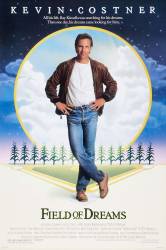Factual error: Joe Jackson batted left-handed in real life, not right-handed as Ray Liotta portrayed. He also threw right-handed and not left-handed like it shows when Kevin Costner is hitting him fly balls to left field.
Factual error: When Ray is walking around the Chisholm Minn, he wipes the dirt off a license plate to reveal a sticker showing the year '72. While Minnesota began using stickers in 1972, they only started putting them in the lower right starting in 1975, with all plates before 1975 containing an embossed year in the lower right.
Factual error: When Ray is in the feed store, he picks up a bag of seeds from the counter and casually walks out. These bags of seeds weigh 50 pounds, so to lift it in the manner he did would require a great deal of strength.
Factual error: Philadelphia Athletics players are wearing green. They didn't wear green until 1963. They wore blue prior to that, very similar to Dodger blue.
Factual error: The catcher appears with the other players when they come out of the corn. The catcher was never included in the scandal, nor was a catcher banned.






Answer: Ray's mission was not confined to easing the pain of his deceased father. Ray himself had a lot of pain and regret over arguing with his father about baseball. Ray was also supernaturally guided to seek out the angry writer Terence Mann (who had always dreamed of playing professional baseball, but never did). When he travels to Boston looking for Terence Mann, Ray and Terence both hear the words "Go the distance," convincing them to travel to Chisholm, Minnesota, looking for an ex-ballplayer named "Moonlight" Graham (who never actually got to bat in the big league, either). As it turned out, Graham was long-since deceased, but Ray and Terence meet Graham's young ghost who returns with them to join the cornfield team. So, "Ease his pain," applied not only to Ray's father, but also to Ray himself and to writer Terence Mann and to Moonlight Graham. "Go the distance" was about traveling to bring both Terence Mann and Moonlight Graham into this magical place where all of their lost dreams could be fulfilled, as well.
Charles Austin Miller
I think "go the distance" has a metaphorical connotation of seeing your choices through in life, and finding the beauty in them. It also implies doing the work you need to do confront your past, resolve your past hurts, and find the strength to move forward.
Michael Albert
Well, in that sense, "Go the distance" is just a generic platitude. What we know is that each of the supernatural messages carried an urgent instructional connotation, calling for Ray to be proactive toward a specific goal: Bringing together these anguished souls (both dead and living) to live out their lost dreams and finally find peace.
Charles Austin Miller